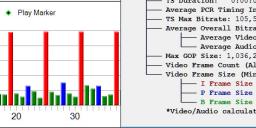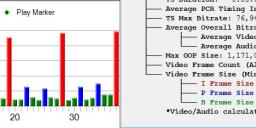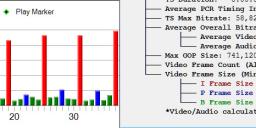
It allows to keep PV going, with more focus towards AI, but keeping be one of the few truly independent places.
-
I tested apefos' modified version of Flow Motion v2.02 over the weekend and analyzed the results. I primarily tested 720p60 SH mode and 1080p24 24H mode, but verified that the other video modes functioned as intended.
Apefos stated his main purpose was to produce a more reliable 720p video mode, using FM2's 100Mbps GOP6 SH mode as a starting point. The version I tested uses a GOP9 format with a reduced maximum bitrate. FM2 was designed and tested for use with Class 10 SD cards rated at 30MB/sec or higher, for which it supports 4GB file-spanning in all 60Mbps video modes. Apefos did not claim file-spanning support for his modified version, and I didn't run tests on that feature. My tests all used a Sandisk 16GB 30MB/sec SD card, with a Lumix 14-50mm f2.8-3.5 zoom, set at f8, 1/125 sec, and ISO 200. Shooting conditions were very similar to those I used to develop Flow Motion v2 originally. Here's an example video, shot in FM2 100Mbps 720p SH mode:
I conducted separate reliability and image quality tests of both FM v2.02 and apefos' revised version. In all cases but one, both patches passed all reliability tests. Apefos' version failed to complete recording in one 720p60 SH trial out of a dozen shots of an intentionally overexposed, highly-detailed subject. I had to pop the battery to restart the GH2, but nothing else was amiss. While this may have been a fluke (since I was unable to reproduce the failure), it's pretty typical of what I've experienced with high-bitrate 720p SH mode patches in the past. Consequently, I was unable to confirm whether apefos' GOP9 720p patch is verifiably more (or less) reliable than FM v2.02.
To evaluate image quality, I used cbrandon's StreamParser and Elecard's StreamEye to evaluate average bitrates and encoded quality factors used in I, P, and B-frames. Here is a StreamParser plot of the FM2 720p SH video above:

Vital statistics - FM2 720p60 SH mode, GOP: 6-frames IBP, max bitrate: 105Mbps, avg bitrate: 75Mbps, avg I-frame: 450K, avg P-frame: 156K, B-frame: 80K
This video exhibits FM2 working in 720p mode as intended: GOP6, max peak bitrate, high avg bitrate, large I-frame size, compact P and B-frame sizes. Compare now to the same scene shot in apefos' modified patch:

Vital statistics - Apefos 720p60 SH mode, GOP: 9-frames IBP, max bitrate: 77Mbps, avg bitrate: 54Mbps, avg I-frame: 433K, avg P-frame: 115K, B-frame: 57K
Apefos' patch is tuned to record at bitrates around 25Mbps lower than FM v2.02. This does not necessarily produce lower video quality, since it uses a GOP9 format and comparably large I-frames as FM2. Its statistics reminded me of FM2's 60Mbps 720p H mode, and I shot the same scene in H video mode for comparison:

Vital statistics - FM2 720p60 H mode, GOP: 6-frames IBP, max bitrate: 59Mbps, avg bitrate: 52Mbps, avg I-frame: 394K, avg P-frame: 89K, B-frame: 42K
Both apefos SH mode and FM2 H mode produce similar average bitrates of around 50Mbps. FM2 H mode, however, was designed to insure 4GB file-spanning for long-take static shots that don't require as much bitrate as 100Mbps SH mode videos. In FM2 H mode, P and B-frame sizes are tuned relatively smaller than its I-frames, preserving static I-frame image quality.
To compare the quality of these three shots in finer detail, I analyzed their I, P, and B-frames in Elecard Streameye. The key quality factor in H.264 encoding is the Q-level used to encode macroblocks, with lower Q's preserving higher image quality. In FM v2.02, macroblock Q-level ranges from 17 upwards, with varying Q-levels used in I-frames, and a single Q-level used in each P and B-frame. Here are typical Q-level statistics I gathered from these videos:
FM2 720p SH mode: I-frame: 17-23, P-frame: 19, B -frame: 21
Apefos 720p SH mode: I-frame: 20-24, P-frame: 22, B -frame: 24
FM2 720p H mode: I-frame: 22-24, P-frame: 24, B -frame: 26
From these statistics, we can see how FM v2.02 makes use of its 100Mbps bitrate. Most notable is its ability to encode I-frames at macroblock quality as high as Q17. FM2 uses Q17-Q19 primarily to encode shadow details that would be obscured at lower quality settings. It encodes P and B-frames at relatively lower Q levels, since they contain only corrective details rather than complete images.
While Apefos' patch uses measurably lower Q-factors than FM v2.02, it does a good job allocating its 75Mbps bitrate among I, P, and B-frames. Its performance places it roughly midway between FM2's SH and H modes. All three patches maintain worst-case I-frame quality at high levels, with FM2 H mode sacrificing P and B-frame quality in order to keep its max bitrate below 60Mbps to insure file-spanning reliability.

 FM2 SH 720p60 StreamParser.jpg1175 x 236 - 182K
FM2 SH 720p60 StreamParser.jpg1175 x 236 - 182K
 Apefos SH 720p60 StreamParser.jpg1175 x 233 - 173K
Apefos SH 720p60 StreamParser.jpg1175 x 233 - 173K
 FM2 H 720p60 StreamParser.jpg1172 x 233 - 179K
FM2 H 720p60 StreamParser.jpg1172 x 233 - 179K -
@LPowell Thanks for careful tests.
The reason I developed the modified version was because the original FM v2.02 was stoping recording in 720p SH and H in my GH2 with Sandisk 32BG SDHC 45MBps.
The main settings I found to make it work better was to change to GOP 9 and 72000000 bitrate. GOP 3 and GOP 6 did not work for me in 720p. The 72000000 and 56000000 bitrates also made it more stable in my setup.
Maybe the patchs have different behavior in different camera+card combos. I am using my modified version setj.ini uploaded here in this topic and it is working ok for me. This patch have other tweaks also, but the main tweaks was GOP 9 and 72000000 / 56000000 bitrates for 720p.
-
Try out Spizz T7. Very very good 50p and 60p modes high bitrate throuhout but is very smooth.
Ditto HBR modes.
In my experience analysing these 6 GOP / 3 GOP streams: too high a buffer (eg 95000 on bottom bitrates) although produces better Quantisation but at the expense of poorer i frame sizes, yet, too low a buffer (eg 38000 on bottom bitrates) which works equally great gives larger i frames at the expense of poorer quantisation of the picture. Try it!
Spizz T7 is tried and tested to sit in the middle: 55000 on bottom bitrates (which should be named buffer in ptools!) for HBR/50/60i and 62000 avg for 720p modes along with a measured scaling table rendering out artefacts. Subsequently bitrates stay high even for less detailed pictures and iron out the any mosquito noise/artefact shit. Death charts or very high detailed pictures will take it to the extreme high tops of the allocated bitrate. Other settings Ive looked at just dont produce the balance.
-
Thanks for the suggestion, but I am avoiding GOP3 and GOP6 in 720p because these GOPs always stop recording in 720p in my camera+card combo.
-
These are the two best patches I found. The two are modified FlowMotion 2.02 Both are stable/reliable for recording with the GH2, Both cleans ok with NeatVideo and are great for high iso.
The setj patch settings (modified FM202) uses GOP3 for 1080p 24p and GOP9 for all others. It does not show diagonal pattern (rain) in 1080p 24p, but in 720p the problem exists. The problem is not recorded in the video file, it is a decoder problem in the player/editing software, so you need to use 5DtoRGB free software to convert the mts files to another format before editing, this solves the diagonal pattern (rain) problem. This is for people who wants the highest possible bitrate in 720p and shortest GOP in 720p
The seta patch settings (modified FM202) uses GOP3 for 1080p 24p and the default Panasonic GOP for all others. This avoids the diagonal pattern (rain) in all modes and there is no need to use 5DtoRGB, you can play/edit the original mts files in all softwares without the diagonal pattern (rain). This is for people who wants great quality in 720p but no transcoding before edit/play.
I am keeping the seta patch in my GH2 because it is great quality and no diagonal pattern (rain) in all play/edit softwares, no need to transcode before edit/play.

 seta.ini9K
seta.ini9K
 setj.ini9K
setj.ini9K -
For my needs the seta patch uploaded in previous post is the best thing I loaded to my GH2 until now.
It has the FlowMotion quantization, matrices and tables, all great features for best image quality from FM202.
It has the best GOP for each mode to avoid the diagonal pattern (rain) problem.
It is the most stable/reliable i tested in 1080p 24p and 720p 60p until now.
The 720p 60p is good quality without macroblocking and homogene high iso noise, upscales ok to 1080p.
Streamparser shows good distribution of datarate among I, P and B frames.
The image quality in 6400 iso is great in both 1080p and 720p, allows perfect denoise and with small amount of film grain it can turn into a good quality output for blu-ray.
I think now my job is done because all issues are solved.
-
to download all best patches after all tweakings, please go to:
http://personal-view.com/talks/discussion/11069/apefos-top-settings-6-patches-for-gh2-hack
-
I am developing a modified version of FM202 called workhorse to be best quality / reliable / stable in all modes, mainly in 720p 60p because 1080p 24p is already good.
I would like to fill all the empty settings in PToll to complete all the settings for FM202
So I would like to ask you what will be the best settings for:
In Patches for Testers:
Time related settings: Limit 90000
Frame buffer size: 1080i60 FB1 - 1080i50 FB1 - 720p60 FB1 - 720p50 FB1
GOP Related: 1080p24 GOPx2 time
Quantizer: Quantizer table
External Encoder Settings: Encoder setting 1 1080i/p - Encoder setting2 1080p - Encoder setting 3 1080p - Encoder setting 2 1080i - Encoder setting 3 1080i -
In Patches for end users:
Audio: AC3 Compression/Audio encoding bps: would it work with 256000 or 320000 ?
MJPG Movie mode: MJPG Size Adjustments: 480p30 width: would it work with 1280 ? why set it to 960 ?
Many thanks!
-
If you was following my efforts to improve the GH2 quality/stability/reliability, mainly in 720p 60p and 50p, please go to this topic:
Howdy, Stranger!
It looks like you're new here. If you want to get involved, click one of these buttons!
Categories
- Topics List23,964
- Blog5,723
- General and News1,342
- Hacks and Patches1,151
- ↳ Top Settings33
- ↳ Beginners254
- ↳ Archives402
- ↳ Hacks News and Development56
- Cameras2,361
- ↳ Panasonic990
- ↳ Canon118
- ↳ Sony154
- ↳ Nikon96
- ↳ Pentax and Samsung70
- ↳ Olympus and Fujifilm99
- ↳ Compacts and Camcorders299
- ↳ Smartphones for video97
- ↳ Pro Video Cameras191
- ↳ BlackMagic and other raw cameras121
- Skill1,961
- ↳ Business and distribution66
- ↳ Preparation, scripts and legal38
- ↳ Art149
- ↳ Import, Convert, Exporting291
- ↳ Editors191
- ↳ Effects and stunts115
- ↳ Color grading197
- ↳ Sound and Music280
- ↳ Lighting96
- ↳ Software and storage tips267
- Gear5,414
- ↳ Filters, Adapters, Matte boxes344
- ↳ Lenses1,579
- ↳ Follow focus and gears93
- ↳ Sound498
- ↳ Lighting gear314
- ↳ Camera movement230
- ↳ Gimbals and copters302
- ↳ Rigs and related stuff272
- ↳ Power solutions83
- ↳ Monitors and viewfinders339
- ↳ Tripods and fluid heads139
- ↳ Storage286
- ↳ Computers and studio gear560
- ↳ VR and 3D248
- Showcase1,859
- Marketplace2,834
- Offtopic1,319






